Babies are known for their adorable and sometimes peculiar behaviors, including fake coughing. While it may seem like a harmless and amusing habit, many parents wonder why their babies fake cough and whether it is a cause for concern and it’s a common question why does my baby fake cough?
Understanding baby’s coughing and differentiating between real and fake cough can help shed some light on this common behavior.
Coughing is a natural reflex that helps clear the airways of irritants and mucus. However, babies may also cough for non-medical reasons, such as to get attention or imitate others.
Differentiating between real and fake cough can be challenging, but some signs can help. For example, a fake cough may be more repetitive and exaggerated, and the baby may not show any other symptoms of illness.
Why babies fake cough is not fully understood, but it is believed to be a normal part of their development and social interaction. Babies may fake cough to get attention, express excitement or frustration, or imitate others.
While it is generally not a cause for concern, parents should be aware of possible health conditions that may cause persistent or severe coughing.
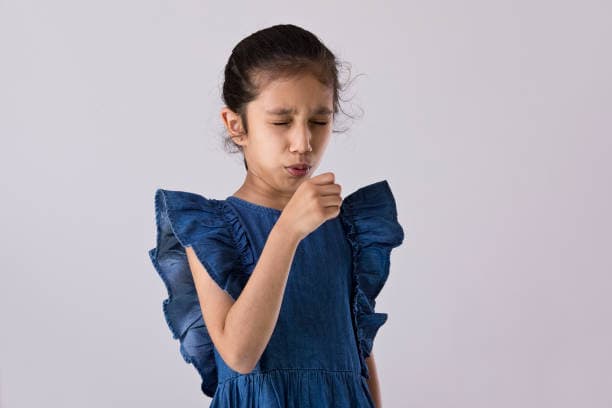
Key Takeaways
- Coughing is a natural reflex that helps clear the airways, but babies may also cough for non-medical reasons.
- Differentiating between real and fake cough can be challenging, but some signs can help.
- Babies may fake cough for various reasons, but it is generally not a cause for concern. Parents should be aware of possible health conditions that may cause persistent or severe coughing.
1. Understanding Baby’s Coughing
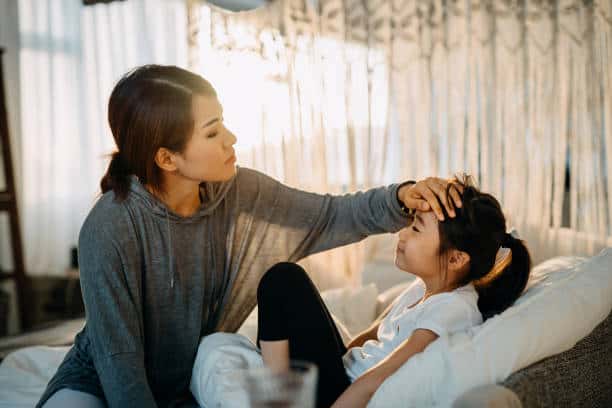
Coughing is a common noise that babies make, and it can have various reasons. A baby’s cough can sound different depending on the reason for the cough.
Some coughs are dry, while others are wet. Understanding the different types of coughs can help parents determine the reason for their baby’s cough.
One of the most common reasons for a baby’s cough is a respiratory illness. A respiratory illness can cause a variety of cough symptoms, including dry cough, hacking cough, and wheezing.
If a baby has a runny nose or a fever, it could be a sign of a respiratory illness.
Croup is another respiratory illness that can cause a baby to cough. Croup is a viral infection that affects the upper airway and can cause a distinctive barking cough.
It is more common in babies and young children.
Temperature can also be a factor in a baby’s cough. If a baby is in a cold environment, they may cough due to the dry air.
Conversely, if a baby is in a hot environment, they may cough due to the heat.
In some cases, a baby may fake cough as a way of getting attention. This is more common in older babies who have learned that coughing can get them attention from their parents.
In conclusion, understanding the reasons for a baby’s cough can help parents determine the best course of action. If a baby has a cough that is persistent or accompanied by other symptoms, it is important to seek medical attention.
2. Differentiating Between Real and Fake Cough
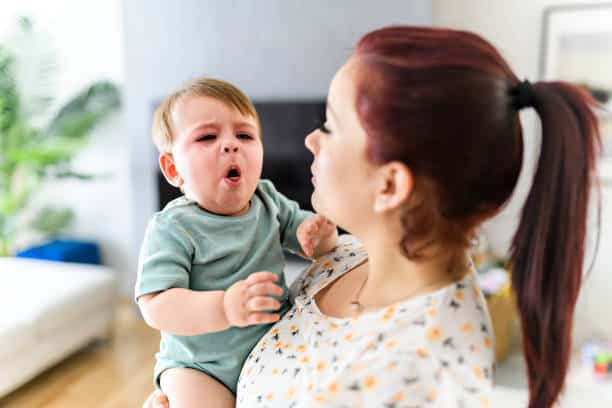
When a baby coughs, it can be difficult to determine if it is a real cough or a fake cough. Here are some ways to differentiate between the two:
Real Cough
A real cough is a reflex action that helps clear the airways. It can be caused by various factors such as allergies, infections, or irritants in the air.
A real cough is usually accompanied by other symptoms such as congestion, runny nose, or fever.
Fake Cough
A fake cough is a learned behavior that babies use to get attention or to imitate others. It is usually a dry cough that does not produce any mucus.
A fake cough may be accompanied by a smile or a giggle.
To differentiate between a real and a fake cough, parents can look for the following signs:
- Timing: A fake cough may occur when the baby wants attention or when they see someone else coughing. A real cough is usually more frequent and occurs throughout the day and night.
- Sound: A fake cough is usually a dry cough that does not produce any mucus. A real cough may produce phlegm or mucus.
- Other Symptoms: A real cough is usually accompanied by other symptoms such as congestion, runny nose, or fever. A fake cough does not have any other symptoms.
Parents should also observe their baby’s behavior to determine if the cough is real or fake. If the baby seems otherwise healthy and happy, it is more likely to be a fake cough.
However, if the baby is showing signs of illness such as fever or difficulty breathing, it is important to seek medical attention.
In conclusion, differentiating between a real and a fake cough can be challenging for parents. However, by observing the timing, sound, and other symptoms, parents can determine if the cough is real or fake.
If parents are unsure, it is always best to seek medical attention to ensure the baby’s health and well-being.
Also read: Best Play Kitchen 2021
3. Why Babies Fake Cough
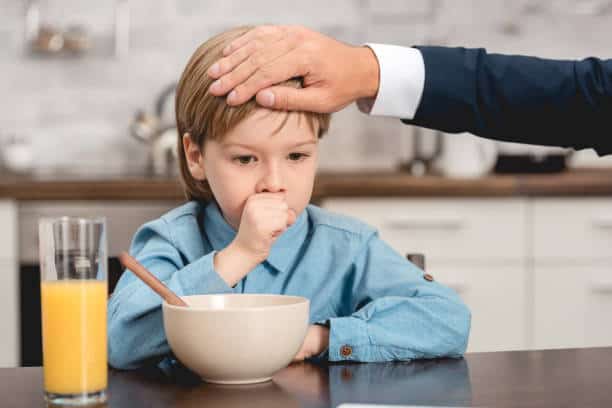
Babies are known to fake coughs, and this can be a cause for concern for many parents. However, it is essential to note that this behavior is not uncommon among babies.
In most cases, babies fake coughs for attention or to play.
When a baby fake coughs, it is often a way of getting attention. Babies love attention, and they will do anything to get it, including fake coughing.
They know that when they cough, people will pay attention to them, and this is what they want.
Another reason why babies fake coughs is to play. Babies love to play, and they will often use fake coughs to initiate play.
They may also fake coughs to get their parents to play with them.
Babies also fake coughs to communicate. When a baby is trying to communicate with someone, they may use fake coughs to get their attention.
They may also use fake coughs to express their emotions, such as frustration or anger.
Furthermore, fake coughing can also be a way for babies to explore their skills. Babies are constantly learning and exploring their environment, and fake coughing is just one of the ways they do this.
Lastly, babies may fake coughs to get touch. Babies love to be touched, and they may use fake coughs to get their parents to touch them.
When a baby fake coughs, they know that their parents will come closer to them, and they can get the touch they crave.
In conclusion, babies fake coughs for various reasons, including attention, play, communication, exploration of skills, and touch. It is essential to understand that this behavior is not uncommon among babies and is generally harmless.
Related Posts:
- How To Stop Toddler From Throwing Food?
- My Child Laughs When I Discipline Him
- When Do Babies Burp Themselves?
4. When to Seek Medical Attention

If your baby’s cough persists or worsens despite your best efforts to alleviate it, it may be time to seek medical attention. Additionally, if your baby exhibits any of the following symptoms, it is important to contact a doctor or pediatrician right away:
- High fever
- Wheezing or difficulty breathing
- Rapid breathing or shortness of breath
- Refusing to eat or drink
- Dehydration
- Lethargy or unresponsiveness
These signs and symptoms could indicate a more serious underlying condition, such as pneumonia, bronchiolitis, or asthma. It is important to seek medical help if you are worried about your baby’s health, as prompt treatment can prevent complications and ensure a speedy recovery.
Your pediatrician may recommend additional treatments or medications to alleviate your baby’s cough, or may refer you to a specialist for further evaluation and management. In some cases, hospitalization may be necessary to monitor your baby’s condition and provide more intensive care.
Remember, as a parent, you know your baby best. Trust your instincts and seek medical attention if you are concerned about your baby’s health.
5. Possible Health Conditions
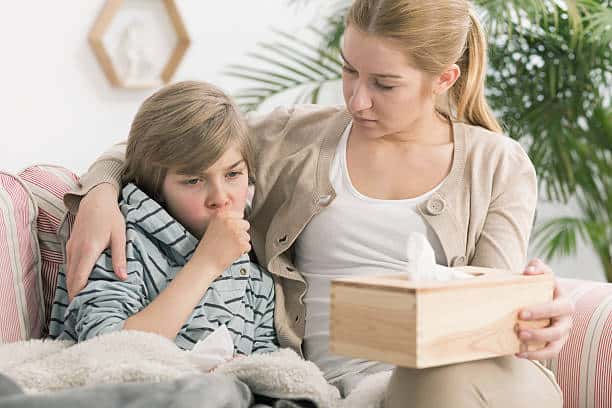
Babies may fake cough for a variety of reasons, including illness. Here are some possible health conditions that could be causing your baby to fake cough:
- Common Cold: A cold is a viral infection that affects the upper respiratory tract, including the nose, throat, and sinuses. Symptoms of a cold include coughing, sneezing, runny nose, and fever.
- Babies may fake cough as a way to clear their throat or to get attention.
- Bronchiolitis: Bronchiolitis is a respiratory illness that is most common in infants and young children. It is caused by a viral infection that affects the small airways in the lungs.
- Symptoms of bronchiolitis include coughing, wheezing, and difficulty breathing. Babies with bronchiolitis may fake cough as a way to clear their airways.
- Pneumonia: Pneumonia is a bacterial or viral infection that causes inflammation in the lungs. Symptoms of pneumonia include coughing, fever, and difficulty breathing.
- Babies with pneumonia may fake cough as a way to clear their airways.
- Asthma: Asthma is a chronic respiratory condition that causes inflammation and narrowing of the airways. Symptoms of asthma include wheezing, coughing, and difficulty breathing.
- Babies with asthma may fake cough as a way to clear their airways.
- Allergies: Allergies occur when the immune system overreacts to a substance in the environment, such as pollen or pet dander. Symptoms of allergies include coughing, sneezing, and itchy eyes.
- Babies with allergies may fake cough as a way to clear their throat.
It is important to note that babies may fake cough for reasons other than illness, such as to get attention or to imitate others. If you are concerned about your baby’s cough, it is best to consult with a healthcare provider to determine the underlying cause and appropriate treatment.
6. Environmental Factors

Environmental factors can play a significant role in causing a baby to fake cough. Dust, for instance, can irritate a baby’s airways, leading to coughing.
The presence of dust in the air can be due to a variety of reasons, such as poor ventilation, dirty carpets, or dusty curtains. Keeping the baby’s environment clean and free of dust can help prevent fake coughing caused by dust.
The overall environment can also play a role in fake coughing. If the air quality is poor, it can irritate the baby’s airways and lead to coughing.
The Centers for Disease Control and Prevention (CDC) recommends keeping the air quality in the baby’s environment clean and healthy. This can be done by using air purifiers or opening windows to let fresh air in.
Another environmental factor that can cause fake coughing is exposure to irritants. For example, strong smells from cleaning products or perfumes can irritate a baby’s airways and cause them to cough.
It is essential to avoid exposing the baby to such irritants and using mild cleaning products with no strong odors.
In conclusion, environmental factors such as dust, air quality, and irritants can all contribute to a baby’s fake coughing. Keeping the baby’s environment clean and free of irritants can help prevent fake coughing and ensure the baby’s overall well-being.
7. Home Remedies and Treatments
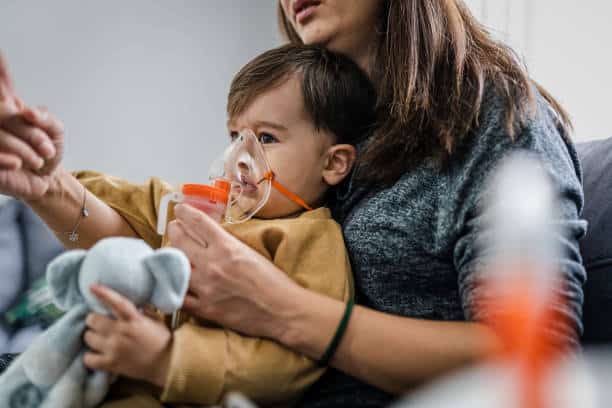
When it comes to treating a fake cough in babies, there are several home remedies and treatments that parents can try. These remedies can help alleviate the symptoms and provide relief to the baby.
One effective treatment for a fake cough is to use a humidifier. This can help moisten the air and make it easier for the baby to breathe.
Additionally, adding a few drops of eucalyptus oil to the humidifier can help further soothe the baby’s throat.
Another home remedy that parents can try is honey. Honey has natural antibacterial properties and can help soothe the throat.
However, it is important to note that honey should not be given to babies under one year of age due to the risk of infant botulism.
If the fake cough is a result of a habit, parents can try distracting the baby with toys or other activities to help break the habit. Additionally, encouraging the baby to drink plenty of fluids can help keep the throat moist and reduce irritation.
Prevention is also key in treating a fake cough. Parents should ensure that their baby’s environment is clean and free of irritants such as smoke or dust.
Additionally, ensuring that the baby is up to date on their vaccinations can help prevent illnesses that may cause a fake cough.
Overall, there are several home remedies and treatments that parents can try to alleviate the symptoms of a fake cough in babies. It is important to consult with a healthcare professional if the symptoms persist or worsen.
8. Feeding and Coughing

When a baby starts coughing during or after feeding, it can be concerning for parents. However, it is not uncommon for babies to cough during or after feeding.
There can be several reasons why a baby may cough during or after feeding, including:
- Stuffy Nose: If a baby has a stuffy nose, they may cough while feeding. This happens because the baby is trying to breathe through their nose while feeding, which can cause them to cough.
- Drool and Saliva: Babies produce a lot of drool and saliva, which can sometimes cause them to cough during or after feeding. This happens because the excess drool and saliva can go down the wrong way and cause the baby to cough.
- Vomiting: If a baby vomits during or after feeding, it can cause them to cough. This happens because the vomit can irritate the baby’s throat and cause them to cough.
- Fluids: If a baby is drinking too quickly, it can cause them to cough. This happens because the baby is taking in too much fluid at once, which can cause them to cough.
- Teething: Teething can cause a baby to produce more saliva, which can cause them to cough. This happens because the excess saliva can go down the wrong way and cause the baby to cough.
- Salivary Glands: Sometimes, a baby’s salivary glands can become overactive, which can cause them to produce more saliva than usual. This can cause the baby to cough during or after feeding.
- Gagging: If a baby gags while feeding, it can cause them to cough. This happens because the baby is trying to clear their airway after gagging.
In most cases, coughing during or after feeding is not a cause for concern. However, if a baby is coughing excessively or seems to be having trouble breathing, it is important to seek medical attention.
9. Coughing and Other Baby Behaviors
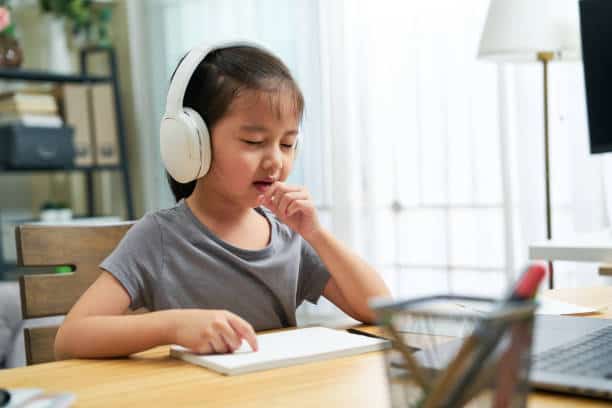
Babies are known to exhibit various behaviors that may seem unusual to adults. One of these behaviors includes fake coughing.
While fake coughing may seem concerning, it is usually a normal part of a baby’s development.
Babies may fake cough for various reasons, including attention-seeking, imitating their parents, or simply exploring their vocal abilities. Fake coughing is not necessarily a sign of illness, but it is important for parents to monitor their baby’s behavior and seek medical attention if they observe any concerning symptoms.
In addition to fake coughing, babies may also exhibit other behaviors such as sneezing, drooling, irritability, pale skin, smacking lips, and crying. These behaviors may be indicative of various health issues or simply a part of normal development.
It is important for parents to stay informed about their baby’s development and consult with a medical expert if they have any concerns.
Changes in a baby’s behavior, such as sudden onset of coughing or sneezing, may be a sign of illness. It is important for parents to monitor their baby’s behavior and seek medical attention if they observe any concerning symptoms.
In conclusion, fake coughing is a normal part of a baby’s development and is usually not a cause for concern. However, parents should monitor their baby’s behavior and seek medical attention if they observe any concerning symptoms or changes in behavior.
Do not miss to check on some related posts:
Conclusion

In conclusion, there are various reasons why a baby may fake cough. These reasons may include caregiver attention, habit cough, psychogenic cough, tic cough, or somatic cough syndrome.
It is important for caregivers to closely monitor their baby’s coughing behavior and seek medical attention if they notice any breathing difficulties or distress.
Foreign body, acid reflux, phlegm, postnasal drip, and sore throat can also cause a baby to fake cough. Therefore, it is important for caregivers to ensure that their baby is not exposed to any foreign objects or substances that may cause coughing.
They should also ensure that their baby is well-fed and hydrated to prevent acid reflux.
If a baby continues to fake cough despite efforts to address the underlying cause, it may be necessary to seek a diagnosis from a healthcare professional. The healthcare professional may conduct tests to rule out any underlying medical conditions and provide appropriate treatment.
Overall, it is important for caregivers to remain calm and neutral when their baby fake coughs. This will prevent the baby from developing a habit cough or psychogenic cough.
By remaining confident and knowledgeable about the possible causes of fake coughing, caregivers can provide appropriate care and support for their baby’s health and well-being.
Frequently Asked Questions
What are some common reasons why babies fake cough?
Babies may fake cough for a variety of reasons, including imitating adults or siblings, seeking attention, or simply exploring their vocal abilities. In some cases, fake coughing may be a sign of an underlying health issue, such as acid reflux or allergies.
Is fake coughing a sign of a health problem in babies?
Fake coughing alone is not necessarily a sign of a health problem in babies. However, if your baby is also experiencing other symptoms such as fever, wheezing, or difficulty breathing, it may be a sign of a respiratory infection or other health issue.
It is always best to consult with a pediatrician if you are concerned about your baby’s health.
How can teething cause a baby to fake cough?
Teething can cause excessive drooling, which may lead to a tickling sensation in the baby’s throat and cause them to fake cough. Additionally, teething can cause nasal congestion or post-nasal drip, which may also trigger coughing.
What are some strategies to help a baby stop fake coughing?
If your baby is fake coughing for attention, try redirecting their attention with a toy or activity. If your baby is experiencing other symptoms such as nasal congestion or post-nasal drip, using a humidifier or saline nasal spray may help alleviate symptoms.
It is important to avoid giving babies cough medicine unless directed by a pediatrician.
Can fake coughing be a sign of attention-seeking behavior in babies?
Yes, fake coughing can be a sign of attention-seeking behavior in babies. Babies may fake cough to get attention or to imitate adults or siblings.
At what age do babies typically start fake coughing?
Babies may start fake coughing as early as 6 months of age, when they begin to explore their vocal abilities. However, it is more common for babies to fake cough between the ages of 1 and 2 years old.

Nurse Practitioner at Venus Med Spa
